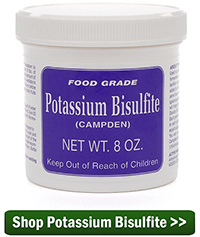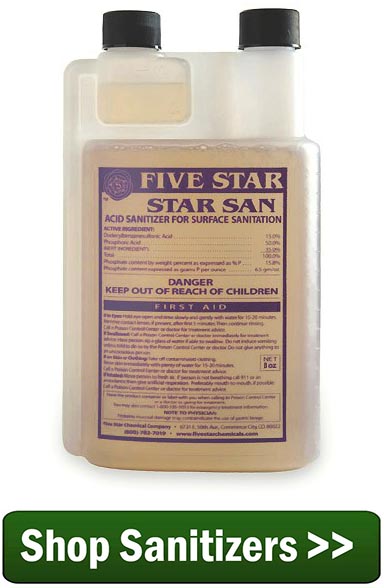 Hi, I have two one gallon batches of wine going. One is blueberry and the other is muscadine. They both smell and taste soured. What is wrong?
Hi, I have two one gallon batches of wine going. One is blueberry and the other is muscadine. They both smell and taste soured. What is wrong?
Brandon A. — NC
—–
Hello Brandon,
It’s really hard for me to know exactly what you did wrong, if anything. What I can tell you is there are two key reasons for a homemade wine spoiling:
- The number one reason for a wine spoiling is because sulfites were not used in the winemaking process — sulfites such as Campden tablets or potassium metabisulfite. Skipping the use of sulfites does not guarantee that your homemade wine will go bad, but it does increase the chance of this dramatically.
- The number two reason for a wine spoiling is that the fermentation vessels and equipment were not sanitized. They may have been washed in soapy water, but not sanitized with something like Basic A or Cleanpro SDH. Soap will get the grime off the surface of the equipment, but to destroy all traces of mold and bacteria that can later grow and take over a wine, you need to use a cleanser of some sort.
The absence of sulfites and cleansers in the winemaking process is the reason almost all wines spoil. They are fundamental and should always be used when making wine.
 Another reason a homemade wine can start spoiling is if the fermentation is not strong. You can sanitize everything and add sulfites to the wine must before fermenting, but all this is futile if the fermentation does not take off quickly and fully. A wine must that is sitting still for several days is a prime target for being taken over by molds, bacteria and other little nasties that might be floating in the air. The wine must is packed with nutrients and sugar. What more could a contaminant ask for?
Another reason a homemade wine can start spoiling is if the fermentation is not strong. You can sanitize everything and add sulfites to the wine must before fermenting, but all this is futile if the fermentation does not take off quickly and fully. A wine must that is sitting still for several days is a prime target for being taken over by molds, bacteria and other little nasties that might be floating in the air. The wine must is packed with nutrients and sugar. What more could a contaminant ask for?
This is one of the reasons you do not want to rely on wild yeast to ferment your wine. As a home winemaker there are too many other airborne microbes competing with the yeast for a place to colonize. You want to use domesticated wine yeast so that it has the upper-hand. The yeast cell count will be greater and the yeast more vigorous. Once you have a solid fermentation, mold and bacteria will not stand a chance. It’s analogous to having a solid stand of grass in your yard to help keep the weeds down. A strong fermentation keeps the contaminants down.
 The last thing I’d like to bring up is that your wines may be perfectly fine. If this is your first time making wine, it may be that you have not experience what a fermentation smells and taste like and are just mistaking the usual odors for the wine spoiling. During a fermentation you should be smelling the fruit used to make the wine, but you will often times also experience a sulfur smell from the fermentation — sometimes like a freshly boiled egg. I’m not saying this is what’s going on, I just wanted you to be aware of this.
The last thing I’d like to bring up is that your wines may be perfectly fine. If this is your first time making wine, it may be that you have not experience what a fermentation smells and taste like and are just mistaking the usual odors for the wine spoiling. During a fermentation you should be smelling the fruit used to make the wine, but you will often times also experience a sulfur smell from the fermentation — sometimes like a freshly boiled egg. I’m not saying this is what’s going on, I just wanted you to be aware of this.
It you are correct and your homemade wine is spoiling, one thing you can be assured of is it will get worse. If it is not spoiling, then you will notice the symptoms getting better, until eventually you end up with a great tasting wine. At this point there is little you can do. If the fermentation has finished you should be adding a full dose of sulfites. But, other than that it’s a wait and see proposition. There is nothing you can do to reverse any effects. Time will take care of this homemade wine if is still fresh and not spoiled.
Best Wishes,
Ed Kraus
—————————————————————————————————————–
Ed Kraus is a 3rd generation home brewer/winemaker and has been an owner of E. C. Kraus since 1999. He has been helping individuals make better wine and beer for over 25 years.

Ed,
First let me say that I’ve purchased items from you in the past and found them at my local brew shop! Well, all 36 gallons of chardonnay, muscat, vioginier, riesling and gewürztraminer became oxidized because I let it age in carboys after secondary fermentation. All tasted fantastic after secondary and I was looking at aging to round off any rough edges. Time got away from me, they spent 14 months in a cool dark basement topped-up And well sealed. Alas, I forgot to add Camden tablets Along the way and didn’t do a SO2 test.
I moved all to corny kegs and bottling bags only to find they had the weird oxidized taste, yet the color was still nice and very clear. One, the Riesling, was terribly dark and even bitter. All others still have a nice color but still have the oxidized taste.
So do II have to live with my costly mistake or will adding Camden tablets now ‘clean-up’ the mess I made. I Camden tables can be used, how long will it take to be drinkable? If not I’ll use it to make Marc or make the kegged wine into a sparking wine with CO2.
This was my 4th year of wine making, prior years I had no problems and made very good wines from juice and whole grapes
John, Unfortunately, I am sorry, there is no real effective way to reverse this effects of oxidation on a homemade wine.